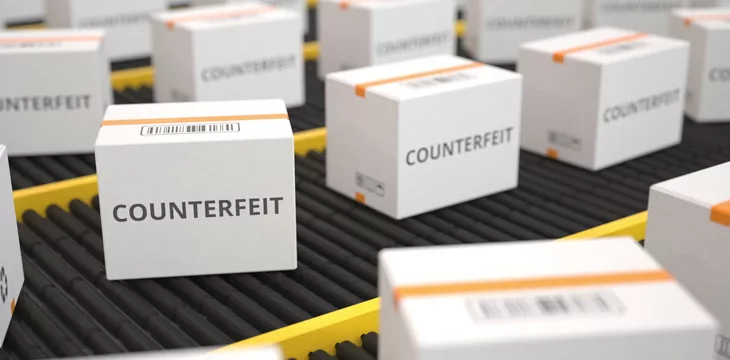|
Getting your Trinity Audio player ready...
|
Blockchain technology could put a serious dent in the counterfeiting of commercial goods, but the full benefits won’t be achievable without a massively scalable blockchain tracking the global supply chain.
The European Union Intellectual Property Office (EUIPO) recently released a study detailing “the deep economic impact of fake products” on certain commercial sectors. The study is a follow-up to a previous study that found significant losses in three specific sectors: clothing (including footwear), cosmetics, and toys.
The toy sector was particularly impacted by fake products, resulting in lost sales of 8.7% of the total volume expected, higher than clothing (5.2%) or cosmetics (4.8%). But the true cost of counterfeit goods isn’t limited to lost sales revenue.
The collective impact on employment in these sectors between 2018 and 2021 amounts to nearly 200,000 fewer people holding on to their jobs. Most of these job losses (160,000) came from the clothing sector. Many sectors are overly concentrated in certain EU member states, with France accounting for a significant percentage of the cosmetics market and Italy dominating the clothing sector.
The study noted the “major impact” COVID-19 had on the three sectors, particularly the clothing industry. This is partly due to the temporary closing of most retail outlets and the resulting shift to online sales, which can prevent consumers from accurately vetting a product’s quality before placing an order.
The amount of counterfeit goods detained at EU border crossings hit a peak of €470 million in 2020, then fell back to €400 million in 2021 (although this was still one-third higher than in 2018). Of the three sectors studied in the report, cosmetics took the biggest pandemic hit from fake goods, doubling from 2020 to 2021, with 2021’s total accounting for 7% of all detained goods.
The authors note that counterfeiting doesn’t just negatively impact the pocketbooks of consumers and manufacturers, given that low-quality products in sectors like
pharmaceuticals “can be a risk to health and safety.” Furthermore, the profits flowing from fake products “fuel[s] organized crime, undermines trust in the rule of law, and negatively affects the environment.”
Even more worrying, an EUIPO/Europol report from 2020 connected counterfeiting with other forms of criminality, “including money laundering, document fraud, cybercrime, fraud, drug production and trafficking, and terrorism.”
Given the current state of the world, the last thing any company needs is an unwanted association with terrorists, even a passing brand mentioned in a news report. The association is even worse if it’s due to someone else flogging some knockoff product, leaving the crooks with all the benefits and the honest company taking the PR hit.
The study cited the need for “a new series of models to measure the economic impact of counterfeiting.” New methods and tools for combatting this scourge are equally necessary, as it’s clear that the old ways aren’t getting the job done.
BSV blockchain to the rescue
For years now, developers building on the BSV blockchain have been promoting the ability of enterprise blockchain technology to eliminate much of the supply chain uncertainty that allows sellers of counterfeit goods—particularly luxury goods—to flourish.
Once incorporated into the manufacturing process, massively scalable and secure blockchains such as BSV offer sorely needed data integrity as goods travel from factories to consumers. Assigning products immutable entries on the blockchain allows consumers to verify each step a product takes along its path to the seller, giving buyers confidence that they’re not being taken for a ride.
This assurance is of particular concern in the EU, where most goods travel across the borders of member states with fewer restrictions than between non-aligned nations. The EU has consistently worked to harmonize cross-border rules and regulations to eliminate friction, and blockchain has a clear role to play.
The EU is working to build a continent-spanning blockchain network in which universities, internet service providers, and the like would function as nodes to verify items such as
professional credentials or travel documents. The ease with which artificial intelligence (AI) image generators can fake such documents for online visual verification adds extra urgency to putting a solution in place.
While Europe plots its future, BSV blockchain-powered companies such as UNISOT have been actively offering product assurance tools since 2020. UNISOT is already issuing digital product passports on the public BSV blockchain, including to companies involved in the production of Halal food, offering consumers confidence in both the authenticity and safety of the foods they eat.
UNISOT recently launched an initiative to bring supply chain verification to Philippines-based agricultural operations. Regardless of the size of their plots, Philippine farmers can utilize UNISOT’s tools with only their smartphones, offering the chance to deploy this revolutionary technology at minimal cost.
UNISOT CEO Stephan Nilsson has stated that companies like his choose to build on the BSV blockchain due to its unmatched capacity to scale and handle the quantities of data required for proper vetting of product provenance.
The Teranode project—currently undergoing a sustained test of its capabilities—will further enhance BSV’s ability to stuff millions of transactions into individual blocks on the chain. BSV also boasts the lowest transaction costs of any blockchain, making the recording of new product information a truly cost-effective procedure.
Blockchain-enabled supply chain monitoring will be among the topics up for discussion at this year’s London Blockchain Conference, which takes place May 21-23 at the ExCel London venue. The wide variety of tracks and topics on the agenda—from AI to Web3 to the Internet of Things and beyond—offer something for everyone interested in benefiting from the vast promise of enterprise blockchain technology.
Watch: Supply chain traceability powered by blockchain tech

 06-30-2025
06-30-2025 





